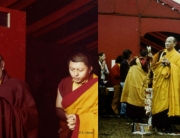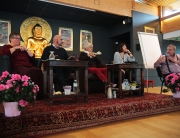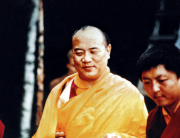A message from Ani Trinlé to introduce this weekend’s seminar…
October 17 and 18, a seminar organized in the context of Dhagpo’s 40th Anniversary will unite top-level speakers to discuss this topic. Chistophe Fauré, Pascale Vinant, and Dominique Davous do us the kindness of returning to Dhagpo to celebrate this anniversary, each having previously partaken in one or more of our previous seminars (Pain and Suffering at the End of Life, Death and Children, Ethics and the End of Life).
Open to all, this seminar offer the opportunity for each speaker to share his background, his approach, and his experiences of being present in the context of accompanying grief and the end of life. This meeting will likewise be an opportunity to exchange with the public, to mutually enrich each and discover the multiple facets of professional, volunteer, and personal accompaniment.
Whether you are invested or not in Buddhist practice, whether you are a health professional or a volunteer, whether you are presently involved in accompanying a loved one, each individual can find resources for living with attentive and fruitful presence for oneself and others.
Christophe Fauré is a psychiatrist and psychotherapist who specializes in accompanying major losses and difficulties: grief, terminal illness and end of life, post traumatic episodes (PTSD), separation, divorce, mid-life transitions. We have known Christian for many years; his great capacity for listening and his care for others can only move and inspire those around him. Christophe has also studied Buddhism and meditation practice and is a familiar face at Dhagpo. He’s a dear friend that we are thrilled to have with us on the occasion of this seminar.
Christophe is also an author recognized for the quality of his works on “major life changes” or “splits.”
- Those of illness: Living Illness with a Loved One
- Of grief: Living with Grief Day-to-Day and After the Suicide of a Loved One
- Of partnership: The Broken Couple, Together But Alone, Do You Still Love Me?, an essay on infidelity, and his latest work, 2014’s Loving You and Your Children
His work Now or Never, Mid-Life Transition received the Prix Psychologies-Fnac 2013 for best essay.
Pascale Vincent is a doctor of palliative care in Paris. Her gentleness and kindness touch those who meet her. We worked together in the framework of a seminar on ethics and the end of life; her clarity and the thoroughness of her contributions were greatly appreciated and enriched the quality of the meeting. Pascale has contributed to several written works, notably in collaboration with Emmanuel Hirsch: End of Life, Ethics, and Society; Treatise on Bioethics, as well as various collective works such as The Manual of Palliative Care and From Care to the Person: The Clinic of Uncertainty. In addition, she has published numerous articles in various journals and reviews.
Dominique Davous comes from Île-de-France’s Regional Space for Ethical Reflection and the association Working with Absence (which accompanies grieving parents and siblings after the death of a child). Dominique’s daughter Capucine passed away at age 17 following a medical error. This became the tragic and painful point of departure which led Dominique, throughout the years, to consecrate part of life and reflection to the ethics and accompaniment of loved ones and to grieving for a child. Through her warmth and presence, she offers support and a ready ear for those in need.
She is the author of several works in which she shares her life experience and reflections: At Dawn on the Eighth Day…Capucine; in collaboration with Annick Ernoult, Group Facilitation Toward Mutual Support for the Grieving. Dominique likewise participated in the collective work of Romain Mazenrod, Doctrine in the Time of Women, and initiated a training film for medical professionals regarding medical errors: What Remains of Our Mistakes? Directed by Nils Tavernier and Gil Rabier.
In addition, Lama Puntso will be moderating this seminar, which speaks for an excellent dialogue. For my part, I’ll intervene to offer a Buddhist perspective on being present for oneself and others. It is with great joy that I envision the coming two days with the these four unique individuals; professionalism, experiences, personal accounts—plus the shared connections that bring us together—will make this meeting, no doubt, an enriching moment for all.
Trinlé








Leave A Comment